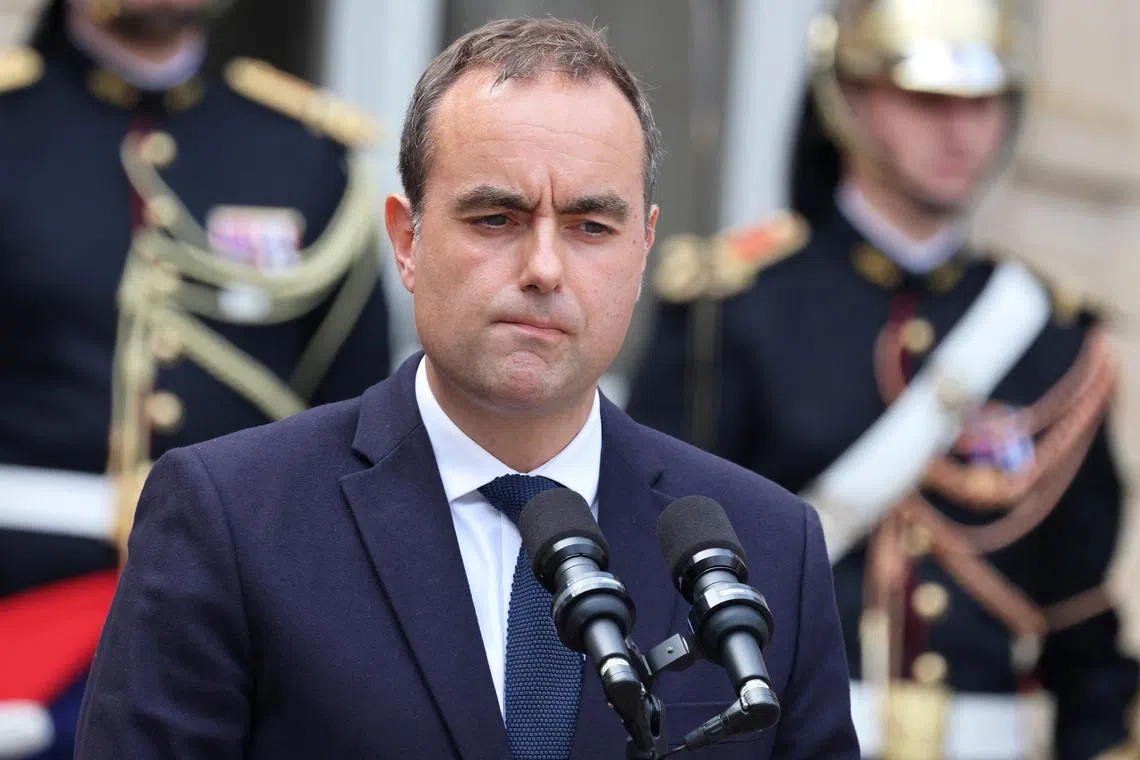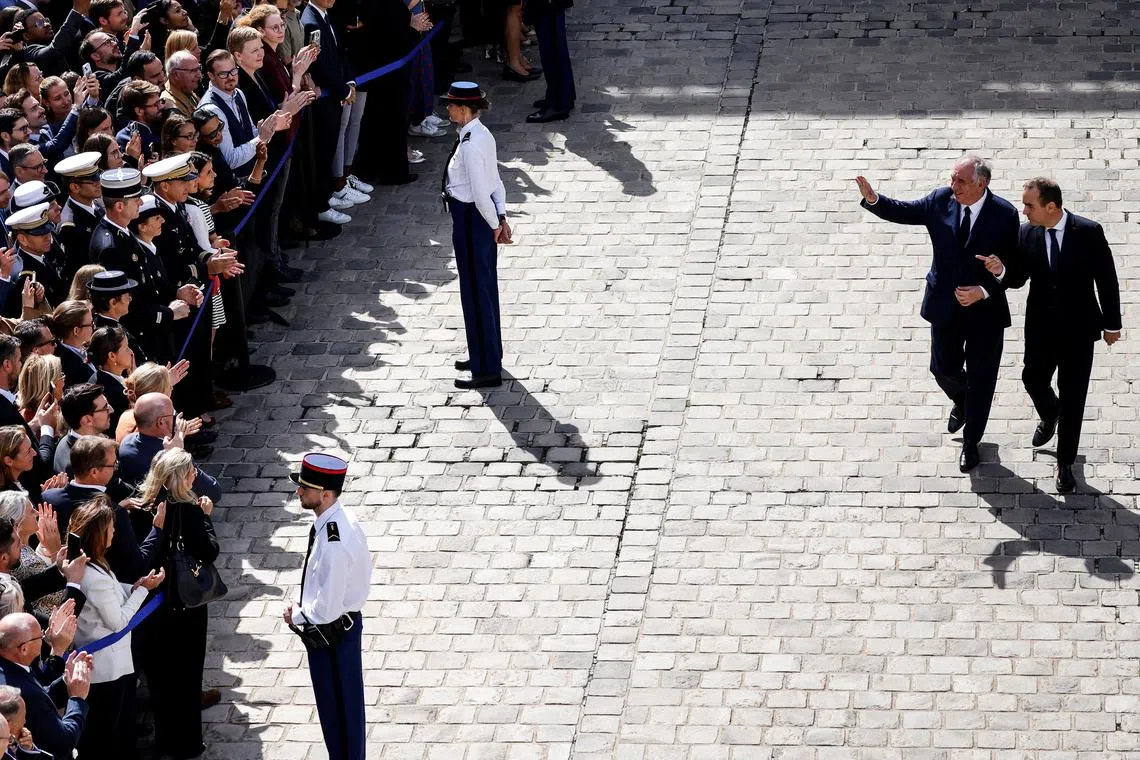France’s new premier is popular in private, but tarred by Macron
Sign up now: Get ST's newsletters delivered to your inbox

France's newly-appointed Prime Minister Sebastien Lecornu (pictured) has been a pillar of President Emmanuel Macron's pro-Ukraine policy.
PHOTO: REUTERS
Follow topic:
PARIS – For all the vitriol flying around French politics in recent months, you will struggle to find anyone with a bad word to say about the new prime minister.
Mr Sebastien Lecornu, a career politician who served as defence minister in the previous Cabinet, is seen as a cordial yet serious figure by leaders across the ideological spectrum.
A senior Socialist party official described him as a savvy politician who is a keen listener. A hard-left lawmaker lauded his sharp mind. It is difficult to find anyone in the National Assembly who would criticise him personally, a rarity in France’s highly fractious political arena.
In private, even the far-right leader Marine Le Pen has praised President Emmanuel Macron’s latest prime minister for his professionalism and the respectful manner with which he has treated her party.
Mr Lecornu, 39, prides himself in getting along with everyone except perhaps with one of the more fiery figures on the far left, he was quoted as saying in French daily Le Monde.
While those chops may ultimately not be enough to forge a majority behind his budget plan, his cross-party appeal will give him a fighting chance in France’s divided lower house of Parliament.
Parliamentary maths
The conservative-turned-centrist steps into the breach just days after Mr Francois Bayrou’s administration was toppled as the far right and left joined forces in a confidence vote to reject a budget plan for €44 billion (S$66 billion) in tax hikes and spending cuts.
Proposing a budget will be one of the first major tests for the new premier who, in order to avoid the same fate as his predecessor, will need to quickly rewrite fiscal plans, with concessions to buy at least implicit support from some of Mr Macron’s powerful opponents, but without losing his own pro-business centrist base.
In his inaugural speech on Sept 10, Mr Lecornu pledged to change the way the government deals with the opposition, stressing that negotiations must be more creative and technical.
“We will get there,” Mr Lecornu said, without providing details on his plans to get the budget over the finish line.
In his first day in office, Mr Lecornu reached out to the left. He held calls with the leader of the Greens and with a prominent union leader.
But he has yet to hold talks with the Socialists, who Mr Macron sees as the bloc that’s most likely to come on board with the groups that already support the government to pass the budget, according to people familiar with the president’s thinking.
Socialist lawmakers who helped Mr Bayrou get the 2025 budget through Parliament have refused to be part of the new government, but say they are open to consulting with the new premier on policies.
“Lecornu at Matignon basically means Emmanuel Macron at Matignon,” Socialist leader Olivier Faure said on Sept 10 on France Info radio, referring to the official name of the prime minister’s office.
The Socialists demand a budget that is less painful for households. They have also lobbied the government to dump plans to cut two public holidays as a way to reduce costs and to increases taxes on the ultra-rich. It is unclear what concessions Mr Lecornu might be willing to make, but even his allies suggest he will need to be flexible.
“Of course we need to cut more public expenditure but if it takes moving from the €44 billion proposed by Bayrou to another figure, then we are willing to do so” Ms Eleonore Caroit, a senior Macronist lawmaker, told Bloomberg TV.
While the government is pinning its hopes on a possible deal with the moderate left, chances of an accord with the far-right National Rally, the largest party in the lower house, appear slim.
Minutes after Mr Lecornu’s appointment was made public, Le Pen wrote in a social media post that Mr Macron had fired his last shot in naming Mr Lecornu and reiterated her call for snap legislative elections, which she deemed inevitable.
Le Pen’s hard stance amid judicial woes marks a shift in her once cozy ties with the new premier. Mr Lecornu’s willingness to engage with Le Pen and her deputies extended to hosting her for dinner at the Defence Ministry, according to French media reports.

France’s newly-appointed Prime Minister Sebastien Lecornu escorts France’s outgoing Prime Minister Francois Bayrou towards the exit at the end of the handover ceremony at the Hotel Matignon in Paris on Sept 10.
PHOTO: REUTERS
The party declined to comment on the reports. Mr Lecornu personally lobbied to win the far-right party’s support for France’s military budget.
The National Rally vice-president, Mr Louis Aliot, struck a more measured note on Mr Lecornu’s promotion insisting Le Pen’s remarks did not mean the party would automatically seek to vote him out.
“We won’t censure in principle, but Lecornu has a mandate to negotiate with the Socialists,” Mr Aliot said in an interview, while underlining that any outreach to the Socialists is going to be problematic for the party. “It’s obvious that we won’t stay quiet.”
Macron’s hope
Despite the uncertain outlook for Lecornu’s survival amid a narrow path to shoring up the nation’s finances, Mr Macron is betting that he can succeed.
In naming Mr Lecornu, Mr Macron chose a trusted ally who has stood by the French leader from the start. Mr Lecornu was Mr Macron’s top pick for the premiership back in December when Mr Bayrou wrestled it away by threatening to withdraw support of his centrist party at the last minute.
Mr Lecornu is one of the president’s closest confidants, the only minister to serve continuously since 2017, and the youngest defence chief in modern French history.
Mr Macron is said to view Mr Lecornu’s background as a grassroots politician, who lacks the elite academic credentials of many of his contemporaries, as an asset.
The mild-mannered premier is from a region of France that was once a centre-right stronghold, swung to Mr Macron in 2017, and then shifted almost entirely to the far right in 2022. Mr Lecornu has been a pillar of Mr Macron’s assertive pro-Ukraine policy and the two have been in lockstep over the need to beef up France’s defence prowess.
For Mr Macron, the gamble is clear: either Mr Lecornu can navigate political crises to keep the minority government afloat or his appointment merely delays a broader reckoning with voters. The outcome will define both Mr Lecornu’s premiership – and Mr Macron’s remaining time in office. BLOOMBERG

